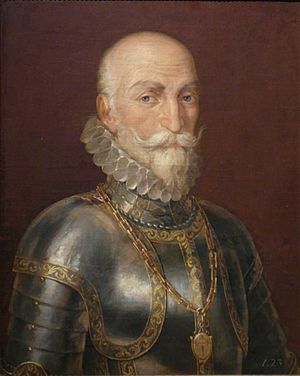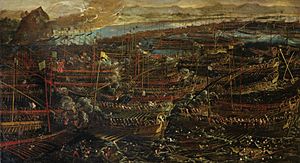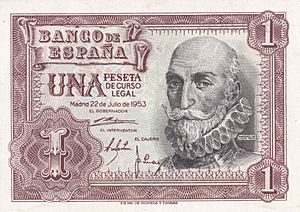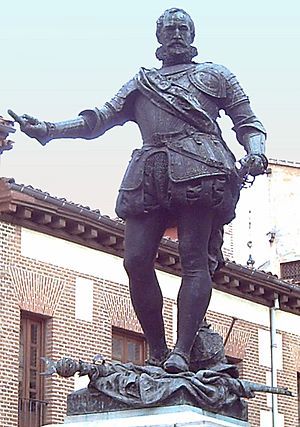Álvaro de Bazán, Marquis of Santa Cruz facts for kids
Quick facts for kids
Marquis of Santa Cruz
|
|
|---|---|
 |
|
| Born | 12 December 1526 Granada, Castile |
| Died | 9 February 1588 (aged 61) Lisbon, Portugal |
| Buried |
Viso del Marqués
|
| Allegiance | |
| Service/ |
Spanish Navy |
| Years of service | 1544–1588 |
| Rank | Captain General of the Sea General Admiral |
| Battles/wars | Battle of Muros Bay Siege of Malta Battle of Lepanto Battle of Ponta Delgada Conquest of the Azores Drake's 1587 expedition (there was no direct combat) |
Álvaro de Bazán y Guzmán, 1st Marquis of Santa Cruz (born December 12, 1526 – died February 9, 1588) was a famous Spanish admiral. He was also a wealthy landowner.
He was known for never losing a battle in his 50-year career. This is a truly amazing record! His personal warship was called La Loba, which means 'The She-Wolf'. It had a golden wolf statue on the front. He was also a grandee of Spain, which means he was one of the most important nobles in the country.
Álvaro de Bazán helped in many important events. These included capturing a fortress called Vélez de la Gomera in 1564. He also helped save people during the Great Siege of Malta in 1565. He played a big part in stopping the Alpujarras Rebellion in 1569. He fought in the famous Battle of Lepanto in 1571. He also helped conquer Tunis in 1573. Later, he helped Spain take control of Portugal in 1580. Finally, he led the conquest of Terceira island in 1582.
A Life at Sea
Álvaro de Bazán y Guzmán was born in Granada, Spain, on December 12, 1526. His father, also named Álvaro de Bazán, and his mother, Ana de Guzmán, were important people. Like his father and grandfather, he joined the Order of Santiago. This was a special group of knights. He became a knight when he was just a toddler in 1529!
His grandfather helped conquer Granada in 1492. His father was also a great sailor. He worked with other naval leaders like Giovanni Andrea Doria. Together, they helped recapture Tunis in 1535. His father was highly praised by Emperor Charles V. The Emperor made him the commander of all Spanish naval forces in the Mediterranean Sea.
Young Álvaro followed his father into the navy when he was very young. He quickly rose to a high position among Spanish officers. At only eight years old, he was named "Military Governor and captain of the fortress and city of Gibraltar". This was mostly an honorary title, as his father was truly in charge. In 1564, he helped capture Peñón de Vélez de la Gomera. He also commanded ships that blocked the port of Tétouan. This helped stop pirates who operated from there.
Álvaro de Bazán earned the trust of King Philip II. In 1568, the king put him in charge of the galleys (warships) in Naples. This job brought him close to John of Austria. They worked together when the Holy League was formed. This was an alliance of Christian states against the Ottoman Turks in 1570.
In 1569, he was given the title of Marquis of Santa Cruz. This was because of his role in stopping the Morisco Revolt and his other services. The title was named after Santa Cruz de Mudela, a place his father had bought.

During the events leading up to and after the Battle of Lepanto on October 7, 1571, Bazán always pushed for strong action. In the battle, he commanded the reserve fleet. His quick thinking saved the day when the Turkish commander, Uluj Ali, outsmarted the Christian right wing. Bazán quickly moved his ships to prevent a disaster. The next year, he joined Don John of Austria in taking Tunis.
The Azores and the Armada
When King Philip II claimed the throne of Portugal in 1580–1581, Santa Cruz was in charge of a naval fleet. However, António, a member of the old Portuguese royal family, resisted. He held onto the islands of the Azores. António was supported by French adventurers led by Philip Strozzi.
Santa Cruz was sent as "Admiral of the Ocean" to remove António and his allies in 1582. Even though he was greatly outnumbered, he won the Battle of Ponta Delgada. This battle took place off Terceira Island. He defeated a mix of Portuguese, French, English, and Dutch ships. This victory secured the Azores for Spain.
Santa Cruz believed that England was a serious threat to Spain's empire. He strongly argued for war against England. In a letter to King Philip from Terceira on August 9, 1583, he first suggested the idea of the Spanish Armada. This was a huge fleet meant to invade England.
Santa Cruz was supposed to command this great fleet. He made many detailed plans and estimates for the Armada. However, King Philip was slow to make decisions. He also faced many political and money problems. These issues caused many delays. Santa Cruz was in Lisbon, but he didn't have the resources to prepare his fleet. Then, Francis Drake attacked and burned Spanish ships in Cadiz in 1587.
The king was annoyed by Santa Cruz's independent ideas. He blamed the admiral for the problems and delays. But these issues were really caused by the Crown itself. Santa Cruz died on February 9, 1588, in Lisbon. It is said that the king's unfair criticisms contributed to his death.
Álvaro de Bazán and another naval leader, Pedro Menéndez de Avilés, together designed the large ships called galleons. These ships were used to carry goods between Cádiz and Vera Cruz in New Spain (modern-day Mexico).
The Marquis of Santa Cruz passed away in Lisbon while the Spanish Armada was still being prepared to sail against England.
Legacy and Popular Culture

Álvaro de Bazán is remembered as one of Spain's greatest naval heroes.
Several ships in the Spanish Navy have been named Álvaro de Bazán in his honor. Today, a new type of warship, called the Álvaro de Bazán class frigate, is being built for the Spanish Navy. The first ship in this class is named the Álvaro de Bazán (F101).
His image was even on the 1953 one-peseta banknote, which was a type of money used in Spain.
In the famous book Don Quixote by Cervantes, Álvaro de Bazán is praised. Cervantes calls him "that lightning of war" and "the father of soldiers," and says he was "fortunate and never defeated."
In the 1971 BBC TV series Elizabeth R, an episode called "The Enterprise of England" shows Álvaro de Bazán. It suggests that King Philip's interference hurt his plans and his health.
See also
 In Spanish: Álvaro de Bazán para niños
In Spanish: Álvaro de Bazán para niños


